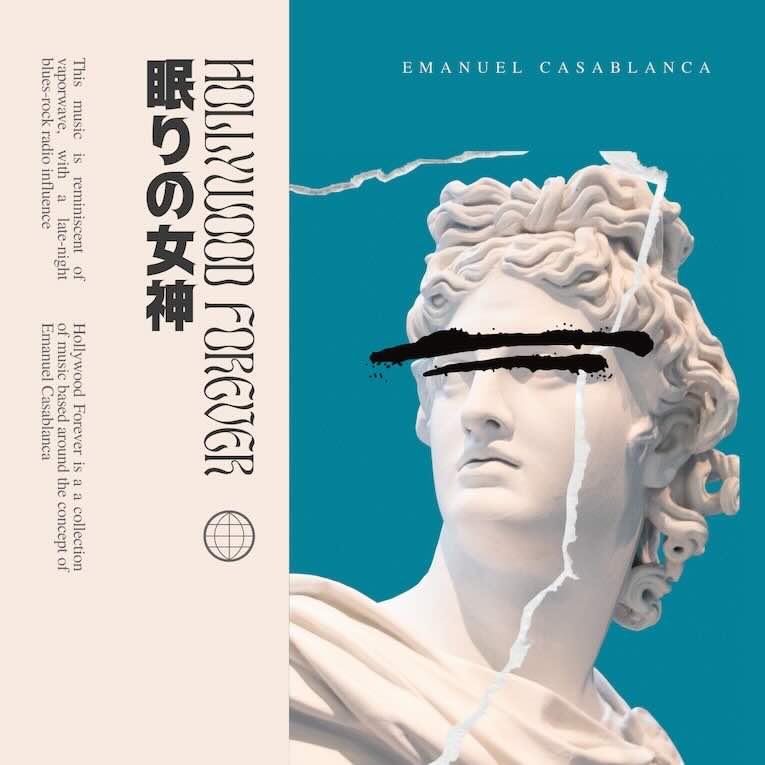
Review: Emanuel Casablanca ‘Hollywood Forever’
By Simon Green
It’s always interesting listening to an album without any knowledge of the artist involved; there’s no preconceptions or unconscious bias, the music stands or falls on its own merits. Of course, that’s how we used to mostly hear music back in the day, a snatch of something new on the radio you’d never heard before that excited interest.
There’s a lot more music that’s easily accessible these days, which can make it hard for an artist to stand out. That is why I imagine Emanuel Casablanca markets himself under the banner of “Bad Boy Of The Blues”, which seems a little cringeworthy, even if it’s a handy marketing ploy. It’s nothing to do with the music of course, although that title does raise certain expectations that the sound might be some punky, frenzied take on the blues with vitriolic lyrics etc, which it certainly isn’t. The artist has commendably founded The Emanuel Casablanca Foundation, a platform dedicated to promoting human rights and social justice causes worldwide, so a forthright approach in the lyrics might similarly have been expected.
The Brooklyn born, ex basketball player has a lot of strings to his bow, including some forthcoming film projects but what does his music sound like? Hollywood Forever is a very accomplished, and generous, collection of sixteen songs that mainly address traditional blues themes, so it’s a case of sexual rather than social issues that predominate. The musician has a very smooth, soulful voice, full of character which set these recordings apart from many others in the blues rock field. The collection showcases a wide variety of musical flavours, sometimes in the same song, as on ‘Dirty Luck’ which cuts abruptly from a heavy riff-based number into a delightfully melodic acoustic based instrumental, albeit with a heavy backbeat, with flowing phrases.
The title track on Hollywood Forever is fast paced with another sinuous riff underlying the vocal. This song has the star of the show making the bold claim that he “makes the blues look good, sexy”. This number similarly has a dramatic change of pace, with the riff replaced half-way through by a jangling guitar picking out the chords and a gently yearning vocal, that gives way to different guitar parts building to a climatic point that subsides back into a simple guitar part that closes the number. It’s as if two different songs have been joined together, quite different, but complementing each other. The ‘Squeeze’ has a heavy groove, all bottom end fifths, with an angsty chorus: “I’m screwed whether I will or I won’t, damned if I do, damned if I don’t…we don’t call this here no catch 22, we call this here the Squeeze.” ‘Roulette’ is a traditional blues, a solitary acoustic accompaniment on the first verse, which is then joined by a simple bass and drums backing and an electric guitar doubling up the acoustic part. A nice fat solo on this. This has a delightfully phrased, classic bad luck lyric: “Bet it all on you baby, even my very last dime. If a trip around the world was a dollar, I wouldn’t make it to the county line.”
‘Me And The Devil’ changes it up again with a different tonal quality provided by a bobbling synth bass line and additional melodic synth fills and guitar lines weaving in and out of each other. The subject matter may be traditional blues fayre but the approach to instrumentation is certainly not. This epitomises the interestingly varied approach taken to presenting these blues themed numbers in a non-orthodox way. Lyrically, however, this is as traditional as it gets: “You may bury my body down by the highway side, baby, I don’t care where you bury my body when I’m dead and gone”. It’s a nice contrast against the modern instrumentation.
‘Black Man’s Burden’ has a country feel in a tale of a guilty drunk. ‘A Good Day To Die Young’ (its scene setting opening line: “Cocaine powder on my nose, I wiped it off onto my clothes”) begins with the solitary sound of a church organ playing what could be a segment of a Bach chorale before driving guitars enter the picture. ‘India Stoker’ features a slightly unsettling guitar figure dramatically underpinning an equally dramatic vocal. ‘Lust and Lies’ is a fine example of a different approach to the blues, with a reedy, high pitched organ sound taking an almost quirky solo instead of the traditional wailing guitar. ‘Love Strong’ is a soulful ballad that shows off Casablanca’s vocal range, where he channels Sam Cooke’s smooth as honey tone. ‘Low Down Dirty Shame’ continues the slow blues feel, a space that best suits the artist’s melodic tones. ‘Last Fair Deal’ could almost be a Tom Petty song. This has an ear worm of a recurring guitar phrase.
In conclusion, there’s a lot going on, plenty of melodic ideas with stacks of variety and much to wrap your ears around on ‘Hollywood Horever’. Never mind the so-called bad boy advertising, this isn’t outlaw blues, just very good, thinking outside the box blues. Play it again Sam!
Emanuel Casablanca Foundation website
“Mud”

Leave A Comment